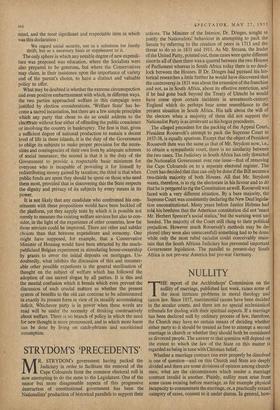THE WELFARE STATE
O subject dominated more conversations about politics during the period of the last Parliament than the future of the Welfare State, yet it cannot be said that the election campaign has done much to illuminate it. The reason is that it is a subject which, in the average elector's mind, Permits of only two possible opinions, and, in the mind of the average practising politician, of only one. The assumption that the only question which the Wplfare State suggests is whether we want it or whether we do not is practically universal among all but the few experts who study its various aspects in detail and with an elaborateness which the public cannot follow; the assumption that the most important thing to be said about the Welfare State is that it must be preserved 1,5 common to all politicians. Hence. the very dim light that is cast by both the main parties' manifestos on this central topic. The Socialist contribution had the merit of simplicity : it Was to propose the disbursement of considerable sums of public money, great enough in the total to disorganise the nation's precarious finances and stimulate a return to inflation, on the abolition of all health service charges and a further increase in National Assistance rates. Added to this was a promise to remove 'the last taint of "public assistance' by creating a new Ministry which would administer public assistance as it is at present administered but combine its functions with those of the present Ministry of Pensions and National Insurance, and would automatically increase benefits to meet any rise in the cost of living.
The Conservative contribution consisted in the main of a statement of abstract principle which was unexceptionable but probably did not make a very vivid impact on the electorate's mind, and the most significant and respectable item in which was this declaration : We regard social security, not as a substitute for family thrift, but as a necessary basis or supplement to it.
The only sphere in which any notable degree of new expendi- ture was proposed was education, where the Socialists were also prepared to be generous, but where the Conservatives may claim, in their insistence upon the importance of variety and of the parent's choice, to have a distinct and valuable policy to offer.
What may be doubted is whether the extreme circumspection and even positive embarrassment with which, in different ways, the two parties approached welfare in this campaign were justified by election considerations. 'Welfare State' has be- come a sacred incantation, but there are a few simple principles which any party that chose to do so could address to the electbrate without fear either of offending the public conscience or involving the country in bankruptcy. The first is that, given a sufficient degree of national production to sustain a decent level of life in these islands, it is the duty of the Government to oblige its subjects to make proper provision for the neces- sities and contingencies of their own lives by adequate schemes of social insurance; the second is that it is the duty of the Government to provide a respectable basic minimum for everyone who is incapable of providing it for himself by redistributing money gained by taxation; the third is that when public funds are spent they should be spent on those who need them most, provided that in discovering this the State respects the dignity and privacy of its subjects by every means in its power.
It is not likely that any candidate who confronted his con- stituents with these propositions would have been heckled off the platform, yet they supply tests by which it is possible not merely to measure the existing welfare services but also to con- sider, in the light of the experience of other countries, how far those services could be improved. There are other and subtler choices than that between expenditure and economy. One might have supposed, for example, that a Conservative Minister of Housing would have been attracted by the much- publicised Belgian experiment in stimulating house-ownership by grants to cover the initial deposits on mortgages. Un-



































 Previous page
Previous page